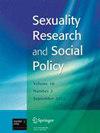检视社会对无性恋的禁忌:反无性恋偏见的基础
IF 2.4
2区 社会学
Q1 SOCIAL SCIENCES, INTERDISCIPLINARY
引用次数: 0
摘要
反无性偏见已经受到了有限但日益增长的公众和学术界的关注。研究对无性恋者的偏见扩展了群体间和群体内关系研究的深度。方法本研究旨在通过考察希腊文化中对无性恋个体的态度来澄清反无性恋偏见。2021年4月4日至5月4日期间,通过在线调查进行了一项探索性横断面研究。187名本科生参与了本研究。双变量相关用于探讨感兴趣的变量之间的关联。接下来,通过对并行多中介模型进行自举分析来检验假设。结果本研究结果支持了与情境相关的社会文化因素(宗教信仰、政治定位)和社会心理因素(遵守社会规范)在预测被试反无性偏见中的作用。结论本研究引起了人们对无性恋污名化的关注。它警告专业人士、政策制定者和社会代理人,主流的性规范社会文化背景可能会对无性恋者的生活产生负面影响。提供有关外群体厌恶的支持基础的信息可能是促进社会变革的一种方式。影响人们生活的利益攸关方和专业人员(教育工作者、卫生专业人员)应该意识到可能的污名化,以避免进一步污名化无性恋者,确保他们不会内化和投射这些陈规定型的假设。本文章由计算机程序翻译,如有差异,请以英文原文为准。
Examining the Social Tabooisation of Asexuality: The Underpinnings of Anti-Asexual Bias
Abstract Introduction Anti-asexual bias has received limited but growing public and academic attention. Examining prejudice towards asexuals expands the depth of intergroup and intragroup relation research. Methods The current study is aimed at clarifying anti-asexuality bias by examining attitudes towards asexual individuals with a multi-item measure in Greek culture. An exploratory cross-sectional study was conducted between April 4 and May 4, 2021, via an online survey. One hundred and eighty-seven undergraduate students participated in the current study. Bivariate correlation was used to explore the associations between variables of interest. Next, hypotheses were examined by performing a bootstrapping analysis for parallel multiple mediation models. Results The findings of this study support the role of context-related socio-cultural (religiosity, political positioning) and social-psychological factors (adherence to social norms) in predicting participants’ anti-asexual bias. Conclusions This study draws attention to the stigmatization of asexuality. It warns professionals, policymakers, and social agents about the dominant sexually normative socio-cultural context that may negatively affect asexuals’ lives. Policy Implications Providing information about the supporting base of outgroup dislike might be a way of promoting social change. Stakeholders and professionals who influence people’s lives (educators, health professionals) should be aware of possible stigmatization to no further stigmatize asexual individuals, ensuring they do not internalize and project these stereotypical assumptions.
求助全文
通过发布文献求助,成功后即可免费获取论文全文。
去求助
来源期刊

Sexuality Research and Social Policy
SOCIAL SCIENCES, INTERDISCIPLINARY-
CiteScore
4.70
自引率
7.70%
发文量
100
期刊介绍:
Sexuality Research and Social Policy is an international multidisciplinary forum for the publication of original peer-reviewed state-of-the-art empirical research on sexuality, theoretical and methodological discussions, and the implications of this evidence for policies across the globe regarding sexual health, sexuality education, and sexual rights in diverse communities. The journal also publishes brief research and conference reports; white papers; book, film, and other reviews; together with guest editorials and commentaries. Sexuality Research and Social Policy occasionally publishes special issues on timely topics.
 求助内容:
求助内容: 应助结果提醒方式:
应助结果提醒方式:


